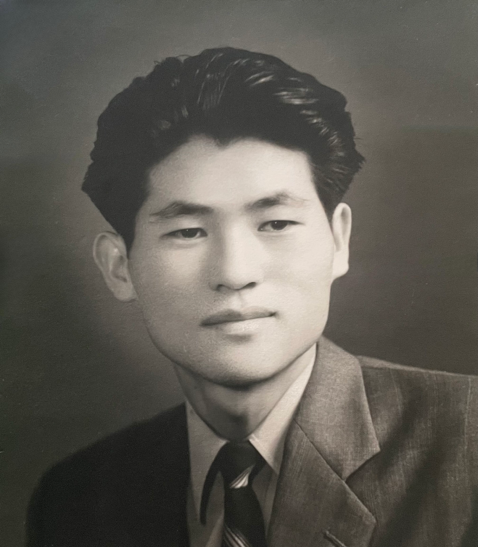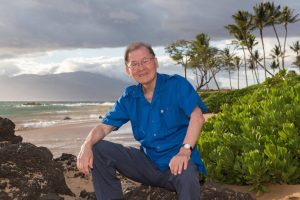Soo Chul Hwang

|
July 11, 1932 - April 24, 2025 |
|
Soo Chul Hwang—known to many as SC Hwang or Steve Hwang—was born in 1932 in a modest farming village near Ulchin, South Korea, to Boon Ae and Han Yong Hwang. He passed away peacefully on April 24, 2025 surrounded by loving family. His earliest memory was of his gentle mother returning from the market, a bundle balanced on her head, and handing him a small bag of pencils. At the time, he had only one pencil—worn nearly to a stub—so this simple gift filled him with joy. It was a moment that captured his enduring love of learning, which would become the cornerstone of his extraordinary life. Growing up under Japanese occupation, he became fluent in Japanese. Following Korea’s liberation, he devoted a year to mastering Korean reading and writing before entering middle school. It was there that he met his beloved English teacher, Mr. Yoon, who would become a lifelong mentor. Under Mr. Yoon’s guidance, he immersed himself in the study of English with unwavering determination, eventually becoming Mr. Yoon’s top student. Recognizing his talent and work ethic, Mr. Yoon recommended him for a job with the U.S. Army Central Intelligence post near their town. While still in high school, he served as the houseboy and translator for the officers, answering phones, translating communications, and performing tasks such as polishing shoes. During this time, he formed meaningful friendships with several American officers. Upon graduating high school, he pursued his studies at Korea University, earning a degree in Economics. From a young age, he had dreamed of becoming a banker—a dream sparked when, as a middle school student, he stepped into a bank and was captivated by the sight of bankers in sharp suits. He made a silent vow that day to one day join their ranks—and he did. In 1961, he married a beautiful young woman, Hyun Sook, and began his professional career with a bank in Korea. Soon after, he was selected to compete for a one-year banking traineeship in the United States. Scoring the highest on the examination, he trained at Seattle First International Bank from 1964 to 1965. During that time, his wife remained in Seoul with their young son, Jay. Their daughter, Mira, was born while he was in Seattle, and he didn’t meet her until she was nine months old. While in the U.S., he visited his old Army friend, Johnny Martin, in Dallas. Johnny introduced him to the president of a local bank, who was so impressed that he offered him a job on the spot. After completing his traineeship, he returned to Korea briefly before moving with his family to Dallas in 1968. Not long after, Seattle First International Bank invited him back to join their International Banking Division. He would remain with the institution—which later became Seafirst and eventually Bank of America—for over two decades. After taking early retirement, he joined U.S. Bank, where he continued to work into his mid-80s. Throughout his career, his achievements were remarkable. During the Asian financial crisis of the 1990s, he provided critical loans to struggling Korean corporations, helping to stabilize the country’s economy. For his efforts, he received letters of gratitude from the President of Korea and earned deep respect from officials in both Korea and the United States. He was responsible for securing over a billion dollars in deposits from the Central Bank of Korea and was formally recognized by the State of Washington for his contributions. His influence extended beyond banking. He was invited twice to North Korea as a U.S. banking representative during the Clinton administration. On his second visit, he was accompanied by his wife, who had fled North Korea at the age of 12. For her, the return was deeply emotional. Together, they traveled the world—his work taking them to many corners of the globe. He was honored to be invited to the White House twice during the Obama administration to attend the Asia Economic Forum, and his wife joined him on his first visit. He was deeply engaged with his community, serving with the Korean Association, the Korea University Alumni Association, and numerous nonprofits. Yet, despite his many accolades, his greatest pride and joy was his family. He is survived by his devoted wife, Hyun Sook; his sons, Jay and Jason; his daughter, Mira; his daughter-in-law, Kay; and his beloved grandchildren, Tim, Emmy, and June. He also leaves behind his sisters, Un Chul and Soong Ki, and a large extended family of nieces, nephews, and cousins. He was preceded in death by his parents, his older brother who died in the Korean War at just 19, two sisters, and his cherished grandson, Robbie—a loss that broke his heart. We take comfort in believing they are now reunited. As the patriarch of the family, he was endlessly generous, supportive, and wise. His legacy is vast—spanning continents, generations, and industries. He touched countless lives, uplifted his community, and lived a life filled with purpose and integrity. We will miss him deeply and remember him always with gratitude and love.
| |
